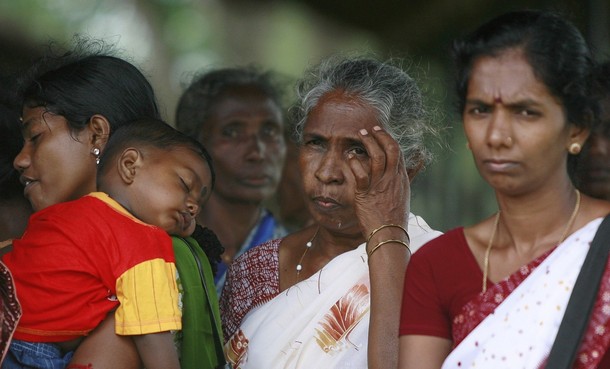
By Shihar Aneez - Thousands of ethnic Tamils displaced during Sri Lanka's war have gone home again, but are finding basic services and infrastructure lacking despite a massive government post-war resettlement programme.
The government has gradually been resettling around 300,000 ethnic minority Tamil people, most displaced in the final phase of the army offensive against the Liberation Tigers of Tamil Eelam (LTTE), which ended with the Tiger's defeat in May after a 25-year war.
Various foreign aid and human rights groups, as well as U.N. officials, have criticised conditions in the camps and have urged the government, which needs foreign help and investment to boost Sri Lanka's post-war economy, to resettle the Tamils quickly. According to government data, it had resettled 127,352 people in their areas of origin as of Wednesday. Over 140,000 are yet to be resettled.
At one point over 280,000 displaced people were being kept under guard in northern Vavuniya, 260 km (161 miles) away from Colombo, inside cramped military-run camps.
Many have now been resettled in their original home areas, after the government determined there was not a threat of land mines. But those Reuters spoke to say the conditions leave much to be desired.
"We don't have drinking water or toilet facilities," said Muttaiah Sivayoganathan, a 53-year-old father of three in the colony of Parannattakal, 10 km north from Vavuniya town.
"Backside forest has been used as our toilet." he said, referring to woods behind his house.
"I don't have any money to resume farming. But still we were asked by the government to build a house on our own land temporarily before proper resettlement."
His wife and three children had gone to have a bath in one of his relative's house in Vavuniya town, where they also cook their food due to lack of clean water around his newly built house.
Walls of the 9 square-meter, one-room house are made of coconut fronds and the roof of galvanised tin sheets. The dirt floor was wet due to pouring monsoonal rain outside. Along with some dry rations, the government gave him 16 galvanised tin sheets, 5,000 rupees ($43.7) in cash, and some farming equipment to rebuild his house and resume his livelihood.
POISONOUS SNAKES
Many others in the resettlement area complained about conditions as well. Some had been bitten by poisonous snakes when they were using forests for lavatory purposes.
"The government should punish those who were involved in terrorism, not all ethnic Tamils," a dejected old man in the colony told Reuters on condition of anonymity.
Two weeks ago, his wife was bitten by a snake, but luckily survived after a four-day treatment in a nearby hospital.
"They promised us (the government would) provide everything. But so far nothing has happened in the last two months since we resettled here."
Some said they stay in the area only in the daylight hours, going to relatives' house at night due to the presence of snakes and lack of facilities.
The Sri Lankan government gave freedom of movement from Dec. 1 to the displaced persons housed in military-run camps, after facing pressure to speed up resettlement not just internationally, but locally ahead of a presidential election Jan. 26.
President Mahinda Rajapaksa's administration promised the United Nations to resettle between 70 and 80 percent of those in the camps by the end of the year and all by end-January.
However, many remain in the camps because their home areas have not yet been opened up as mine clearance operations are still going on.
That is the situation for tens of thousands of Tamils from the former rebel-held districts of Mullateevu and Kilinochchi.
"I won't feel freedom, until I go to my own home," said M. Iruthayanyahi in Vavuniya town while waiting for a bus to return to Manik Farm camp, the largest, after staying 15 days at a relative's house.
She had lost her eldest son on Jan. 10 in Puthukkudiyiruppu in Mullaitivu district by a shell attack and her second son is in army custody over suspicious LTTE links.
Which candidate most of Sri Lanka's Tamil minority chooses to support could be an important factor in the presidential election, with the resettlement process one of the issues.
Rajapaksa's main challenger General Sarath Fonseka, who led the military to defeat the LTTE as the then-commander of the army, says the government has resettled the displaced persons without proper planning.
© Reuters

















No comments:
Post a Comment